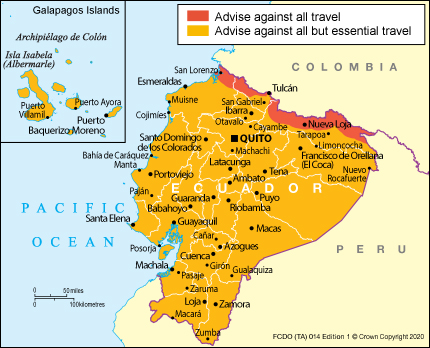
The Foreign, Commonwealth & Development Office (FCDO) continues to advise against all travel to:
- within the 20km exclusion zone along the border with Colombia, except for the official border crossing town of Tulcan in Carchi province
The FCDO advises against all but essential travel to:
- the areas of Tarapoa and the Cuyabeno reserve outside the 20km zone in Sucumbios
- the areas of El Angel Ecological Reserve inside the 20 km exclusion zone in the province of Carchi
- all other areas of Esmeraldas province outside the 20km exclusion zone
- the remainder of Ecuador based on the current assessment of COVID-19 risks
From 4am on 15 January, visitors who have been in or transited through Ecuador in the previous 10 days cannot enter the UK. British and Irish nationals, and third country nationals with residence rights in the UK arriving in the UK from Ecuador will need to self-isolate with their households on their return. Check the latest guidance for England, Northern Ireland, Scotland and Wales.
From 1 January onwards people with residence rights include: holders of Indefinite Leave to Remain; holders of existing leave to enter or remain (i.e those with biometric Residence permits) or an entry clearance/visa that grants such leave e.g. students, workers, etc (excluding visit visas); holders of EU Settlement Scheme (“EUSS”) leave; those who have rights of entry under the Withdrawal Agreements (including returning residents with a right of residence under the EEA Regulations and EEA frontier workers); family members of EEA nationals with rights under the Withdrawal Agreement.
Travel to Ecuador is subject to entry restrictions
- You will need to provide contact details on arrival in Ecuador and present a negative Polymerase Chain Reaction (PCR) test result for COVID-19 taken up to 10 days before arrival.
- Antigen tests (rapid test) will be randomly carried out by the Ministry of Health on arriving passengers.
- If on arrival you do not present a negative PCR test, you will have an antigen test taken. If you test positive, you will need to self-isolate for 10 days.
See Entry requirements for more information before you plan to travel.
Preparing for your return journey to the UK
If you’re returning to the UK from overseas, you will need to:
Check our advice on foreign travel during the coronavirus (COVID-19) pandemic and sign up for email alerts for this travel advice.
If you’re planning travel to Ecuador, find out what you need to know about coronavirus there in the Coronavirus section.
During the COVID-19 pandemic, it is more important than ever to get travel insurance and check it provides sufficient cover. See the FCDO’s guidance on foreign travel insurance.
In light of extensive restrictions on mobility announced on 16 March, British Embassy personnel are mainly working remotely, and are in contact with the Ecuadorean authorities to support British nationals in these exceptional circumstances. If you need urgent assistance, call +593 2 3972 200.
Around 5,900 British nationals visited Ecuador in 2020. Most visits are trouble free.
There were nationwide protests across Ecuador in October 2019, which caused extensive disruption. Some protests became violent, especially in Quito, and led to a number of fatalities. Remain vigilant, avoid any protests or demonstrations and keep up to date with developments via official local sources (ECU 911 emergency services) and this travel advice.
Although Ecuador doesn’t have a history of terrorism, in 2018 there were a number of bomb explosions and kidnappings in the northern province of Esmeraldas. See Terrorism
The security situation in the province of Esmeraldas can change very quickly. If you’re undertaking essential travel in areas of the province beyond the 20km exclusion zone, you should pay close attention to warnings issued by the Ecuadorean authorities, be particularly cautious and vigilant, and monitor this travel advice regularly. See Local travel
Ecuador is situated in an area of intense seismic activity. There is a high risk of earthquakes, volcanic eruptions and tsunamis. You should make sure you are aware of the risks and are familiar with the relevant safety and evacuation procedures. In the event of a natural disaster, you should monitor official channels – the Ecuadorean National Geophysical Institute and the National Service for Risk and Emergency Management (both Spanish only) – and follow the advice of the local authorities. See Natural disasters
Cases of armed robbery are increasing and petty crime is common. See Crime
UK health authorities have classified Ecuador as having a risk of Zika virus transmission. For more information and advice, visit the website of the National Travel Health Network and Centre website.
If you’re abroad and you need emergency help from the UK government, contact the nearest British embassy, consulate or high commission. Consular support may be limited in parts of Ecuador.
The Overseas Business Risk service offers information and advice for British companies operating overseas on how to manage political, economic, and business security-related risks.